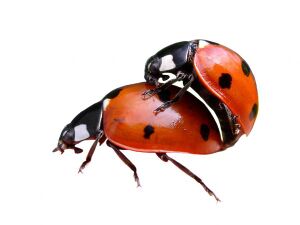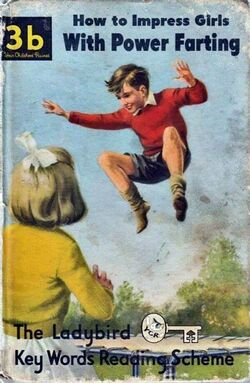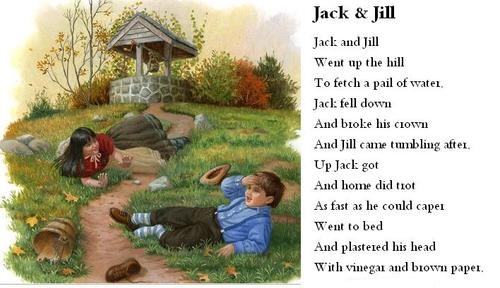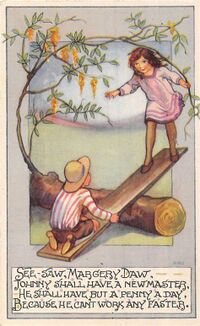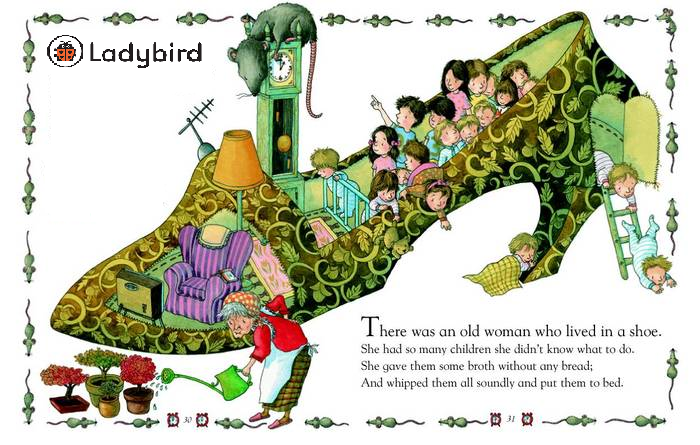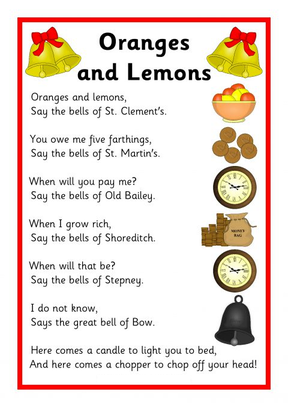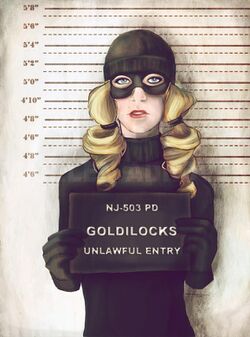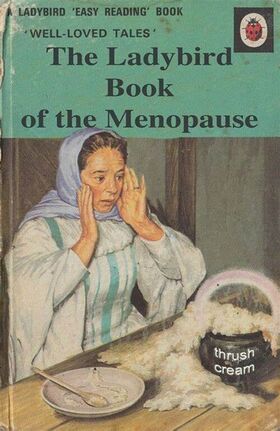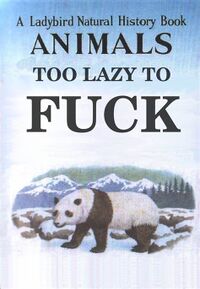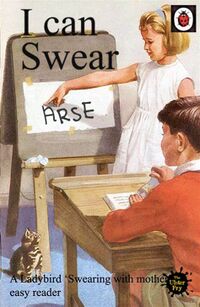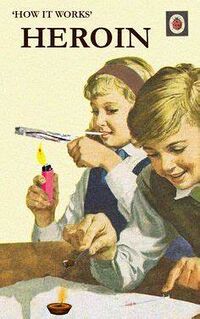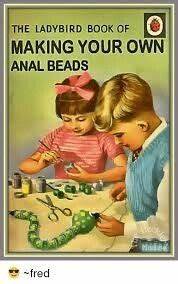Ladybird Books
Ladybird Books is part of the Penguin group, most famous as publishers of Lady Chatterley's Lover. Ladybird, however, specialise in producing books for Primary School ages and generations of pupils have used the books to learn to read and to learn how to sureptiously add strategic phalluses to illustrations without being observed by their teachers. The children's edition of Lady Chatterley's Lover is simultaneously the Ladybird book least purchased by school libraries and the edition that librarians report is most likely to have illustrations ripped out by borrowers.
Ladybird are perhaps best remembered for their 'Keywords Reading Scheme Books', which depicted an idealised family to educate and entertain children. To the despair of the 'liberal' left, the books featured a stereotypical British family: children Peter and Jane, Mum (Mom in American English) the housewife and Dad (Dad in American English). As in the much criticised Enid Blyton books of the same era, Dad is the breadwinner who goes out to earn a respectable living in an office, while Mum stays at home, fends off vagabonds and itinerant tinkers while drinking tea (unless Dad has forgotten to hide the Gin as in 'Peter and Jane help Mum to Bed' and 'Peter and Jane go without lunch again').
However, as children passed beyond Peter and Jane books, they could enjoy Ladybird's 'Learn-about' books, which provided education about the history of British monarchs, The history of the British Empire, British contributions to Science, British sporting heroes, British military history and Why the Irish are an ungrateful rabble who really should know their place by now.
Ladybird books have been published in 70 different languages including Cornish, Estuary English, Scouse, Geordie, Cockney, Received Wigan Dialect and Tetbury Posh Totty. Subtle changes made to the text in international editions provide insightful cultural comparisons. In the Zulu edition of Peter and Jane play house it is Jane (Jabulani) who collects thatch, makes mud bricks and plasters them with dung to build a new home while Peter (Phazima) relaxes by wrestling Cape Buffalo, drinking uMqombothi and eviscerating Red Coats with an assegai. In the French edition of What we did on our holiday, Pierre joins Papa on a picket line to prevent air-traffic controllers getting to work at Charles DeGaulle international airport, while Janette force feeds geese to fatten their livers, before helping Maman make foie gras for the chairman of the local Experimental cinema appreciation group.
Pristine Learn-about books are now highly collectible and less common editions have reached sums approaching £1.50. In 2006, Christie’s oversaw a bidding war that resulted in Moderating a Fast-Breeder Core with Plasticine reaching the then record price of 96p, only for this record to be smashed at Sotheby's the following Autumn when a first edition of Learning to deal with the Zombie Apocalypse came on the market. One Learn-about History book never reached market after intervention from Buckingham Palace but rumours persist that some copies of How that whore, Wallace Simpson, ruined everything escaped being pulped. Speaking on Bargain Hunt, David Dickinson estimated that this much-sought for book "would be a proper Bobby-dazzler that could reach £5, maybe more."
The Keywords Reading Scheme
In a typical edition of the Reading Scheme, Peter and Jane enjoy a range of activities suitable for respectable, middle class, white children; they sneer at passing urchins through the railings of their private school, inform the police of likely benefits cheats in nearby council estates, or organise a pogrom when Gypsies arrive in their Cotswold village. In more than a dozen editions, they ride pretend horses in cowboy hats, shoot imaginary pistols and fantasise about exterminating the native population of the American prairie.
Ladybird Books were illustrated by artists who specialised in their respective fields and who could prove Aryan descent over a minimum of three generations. Over the years, they have come to be seen as works of art in their own right, and displays of the original works have been shown in the Tate, the Louvre and on the fridges of the artists’ mothers.
The format of Ladybird books remained consistent across every series. Text appeared on the left-hand (sinister) page, facing an illustrative picture on the righthand page, so that those as yet unable to read might still learn the correct way to beat one’s servants, condescend to shopkeepers, or invade a distant country. Due to changes in common English vocabulary over 60 years, reprints no longer contain certain contentious terms: Gay has been replaced by Happy, Queer by Strange, Prick by Thorn and the N-word by friend of alternative complexion who may, given sufficient time and heartfelt apology, forgive us for our exploitative past. No acceptable alternatives could be found for Rimming, Soggy Biscuit or Rees-Mogg, consigning the Ladybird book of old Etonians to publishing history.
Following the 2014 takeover by Trotskyite, third wave feminist, transgender, one legged, lesbian, dungaree-wearing misandrists, there would be no further publication of specific books for boys or books for girls. Peter was replaced by Jude, an eight year old of indeterminate sex, equally at home playing with dolls or plotting the overthrow of the fascist patriarchy. Jane remained but now attended a school for the gifted and spent holidays helping African children learn how to fish the Kalahari. Mum now worked in the higher echelons of government, planning macroeconomic policy for small Commonwealth nations. Dad had been forced to leave the marital home to allow Aunty Tina to move in. He is occasionally seen drinking in shop doorways, or unconscious in a dumpster behind Waitrose. He is no longer allowed access to the children as all men are potential rapists.
The 1980s - Nursery Rhymes for the Modern Age
Jack and Jill
The 1980s was a troubling time in children's literature, with traditional favourites coming to be seen as old fashioned, outdated and, in many cases, hopelessly discriminatory. A new breed of Ladybird editors formed the Coccinella Committee to review the published subject matter & potentially sexist-misogynist nursery rhymes were censored or modified to make them more suitable for post-Imperialist Britain.
Jack and Jill Went up the Hill was among the first to be amended as it was felt to suffer from a number of outmoded prejudices. In the 1982 revised edition, the original poem was abandoned entirely and replaced by an eight volume report on the events of the day in question. Jack and Jill still went up the hill but only once Jack had been security-cleared in the presence of a female and all his past sexual-partners had been interviewed to vouchsafed his conduct. Both children were accompanied at all times by a social worker and neither was allowed to carry a bucket or any other potential trip-hazard. The fetching of water from wells was deemed to contravene child-labour legislation and was, in any case, unnecessary in an age of piped, potable water to homes in all but the most remote locations.
In volume seven, Jack's actions in running home after his accident without first checking on his younger sister's condition compel his parents to send him on a week-long course operated by the regional Misogyny working-group. The local Health Trust convene an emergency committee to investigate why NHS 111 had recommended treating concussion and a suspected brain-bleed with clearly inappropriate household waste.
It was felt that the less robust children of the modern age might be traumatised by lingering fear of similar accidents in their own households. To alleviate this concern, volume eight showed Jack and Jill's father losing his job as a hydraulic engineer so that children might see the justice being done. A high court judge criticised his illogical and corruptsigning-off on a contract to construct a well at the top of a hill, stating that “gravity naturally draws water down into valleys where even children as evidently dyspraxic as yours might collect water safely from a spring.”
In the afterword, Germaine Greer discusses Twentieth Century, feminist interpretations of the traditional rhyme in which the well represents a life-giving vagina that we must all struggle towards.
Or some such.
See-Saw Margery Daw
The revised edition of this Medieval rhyme received wide praise, winning the 1984 Booker Prize for its author, E.L. James, and launching her career into new literary heights.
The new edition was both punchier, politically-correct and had sufficient syllables to allow Ladybird to issue the book with an accompanying CD containing versions, performed by luminaries of the Rap world; Eminem, Dr. Dre and Anne Widdecoombe.
See Saw Margery Daw,
Johnny shall have a new overseer of non-specific Gender;
Xhe[1] shall earn but a penny a day,
Because minimum-wage legislation shouldn't apply to a potential sex-offender.
There was an Old Woman who Lived in a Shoe
It being clearly unacceptable for the elderly to be accommodated in footwear, the 1985 edition of the Old Woman who Lived in a Shoe saw her take her many children on a march to parliament in an attempt to protest Tory cuts to housing-benefits for single-mothers and the lack of sufficient Social Housing. Disgracefully, the Metropolitan Police Force then infringe her right to peaceful assembly, kettling her and the children on College Green for several hours before taking them all into custody for obstructing traffic and resisting arrest.
At the old woman's subsequent trial, defending barrister, Basil Kraft-Biscuit, stated that "She had so many children, she didn't know what to do". The Daily Express railed against both her loose morals and her failure to polish her outsize shoe, The Times decried the "profligacy of the Welfare State in supporting welfare-spongers with no intention of finding a job", while The Guardian pointed to "Clear failures of the Social Services to provide adequate advice on birth control measures."
Welfare Minister, Lord 'Big-Bad' Woolfe was interviewed on Newsnight about the affair. A studio argument erupted when he claimed that She wouldn’t have been forced to give her many children broth without any bread has she not squandered her Job Seeker's Allowance on Smack. Labour Party leader, Neil Kinnock, disputed Lord Woolfe's assertion, claiming that "bread-less broth is becoming common up and down the nation due to poor dietary advice in schools and the failure of successive Tory governments to ensure that wages keep up with inflation."
Both Woolfe and Kinnock agreed, however, that whipping the children soundly and putting them to bed did not amount to adequate care. The old woman was jailed for a minimum term of seventeen years on counts of child abuse and sedition. The children were taken into care and denied the opportunity of adoption when no mixed race, disabled couples with learning-difficulties could be found to accommodate them.
The postscript to the revised edition shows some of the children as adults, some years after leaving care: Jackie is in an abusive relationship that she can't leave due to abandonment issues, John has joined the French Foreign Legion in an attempt to put the past behind him but is facing trial at the International War-Crimes Commission for abusing refugee children, Rhys has become a Young Conservative.
Oranges and Lemons
Oranges and lemons was the least amended nursery rhyme in the new editions. The original rhyme was left entirely intact and editors contented themselves with a scholarly footnote below each of the original lines.
Orange and Lemons,
Say the bells of St. Clement's.
St Clement's is a reference to a Church of England parish church in Candlewick Ward of the City of London and its inclusion is inconsistent with the doctrines of a pluralistic society. Specifying one place of worship while ignoring the nearby Central Synagogue on Hallam Street, the Suleymaniye Mosque, Shree Swaminarayan Hindu Temple, and Kagyu Samye Dzong Tibetan Buddhist Centre shows an ignorance of other cultures and the small-minded approach typical of the 1950s mind-set of many original Ladybird authors that we are now seeking to correct. Do you want to make the atheist children next-door cry by making them feel excluded? Shame on you!
You owe me five farthings,
Say the bells of St Martin's.
A farthing is a quarter of an old penny. It was quite correctly banned under EU legislation, which required the former UK to adopt decimal currency to save us from our own falling standards of mental arithmetic. St Martin's is yet another Church of England establishment in the City of London, which only goes to show the lengths that the Nazi theocracy will go to in an attempt to brain-wash the population. Think for yourselves, mini-Sheeple, think!
When will you pay me?
Say the bells of Old Bailey.
The Old Bailey is the popular name for the Central Criminal Court and therefore a bastion of the oppressive, fascist regime which will be torn down come the revolution. The state was still murdering its own population in the name of Law & Order until 1964. How does that make you feel? Can you imagine what it was like to stand on the scaffold, with your head in a black sack, waiting for the trapdoor to open, your only crime stealing a stale crust of bread to feed your poor mother left low by addiction to prescription pain-killers fed to her by her doctor to keep her from rising up and claiming her place at the top table of society. Never again children! Never Forget, Never Forgive!
When I grow rich,
Say the bells of Shoreditch.
Shore Ditch is said to be named after one of Henry VIII mistresses, Jane Shore, and is a symbol of male oppression. The monarchy is an ancient, anachronistic institution that cannot survive much longer in the modern world. We will celebrate its fall, and the filthy parasites who laud it over us from their palaces built on the blood of the people will find themselves up against the wall where they can expect as little mercy as they have given over the centuries. References to getting rich imply support for the capitalist system. Money is the tool of the tyrants. the pursuit of wealth will cloud your mind and deflect you from the path of perpetual revolution. Say no to the so-called "Free"-market. From Each According to His Ability, to Each According to His Needs.
When will that be?
Say the bells of Stepney.
Another place of Christian worship in the City of London. How does that make you feel in your Lancashire hovel? Does it make you want to kick in the doors of authority with your hob-nail boots? Do you think that the metropolitan elite care about poor Welsh children working twenty five hour days in the mines with nothing to eat but coal? Of course they don't! They think only of themselves. They don't even care about the London poor. Just because you live in the capital doesn't mean you have to fall for their trick of giving you a sense of moral superiority over the poor yokel-children of Somerset, or the bare-foot haggis-herders of Strathclyde. We are many, we are one, we are strong!
I do not know,
Says the great bell of Bow.
Another place of Christian worship...you get the picture.
Here comes a candle to light you to bed,
And here comes a chopper to chop off your head!
Just another threat from the patriarchy. What are they trying to say here, children? They're trying to tell you that if you put your head above the parapet then it's off to the Old Bailey for you. Don't believe the lies! My vote doesn't count is the slogan of the oppressed across the world. If we stand together we will stand tall and walk as one to the sunny uplands, where collectivisation of the print and broadcast media will mean that never again will Key Stage One children be indoctrinated with defeatism before they're fully toilet-trained.
The 1990s - Updating the Classics
By the late 1990s, PC culture was becoming old hat. Increasingly, the mood was being set by Brit Pop, Lad Mags such as Loaded and FHM, and popular but contentious sit-coms Red Dwarf, Men Behaving Badly and Terry & June. When Prime Minister, Tony Blair, invited members of Oasis to 10, Downing Street, Ladybird knew they needed to act to remain relevant to a new generation.
The 80s insistence on multiculturalism, inclusivity and sensitivity to the feelings of others was consigned to the remainder bin of history but editors knew that a simple return to the mores of the 60s and 70s would not serve. Instead, they opted to take the classics beloved by a new generation of parents and bring them up to date by excising all traces of the decorum, decency and moral-values that had proved such an impediment to development in the past.
Thomas and Friends
When the Reverend R. W. Awdry first began publishing his stories, Thomas and his Friends inhabited the fictional island of Sodor. He worked for a railway network overseen by the Fat Controller. Initially, Thomas was a pilot engine, shunting unruly wagons around the yard while bigger engines, such as Gordon and James, ran the glamorous cross-island routes[2].
In the updated version, Thomas and Percy live in a run-down Goods Shed and lust after Annie & Clarabell, the beautiful carriages who live next-door but who are out of their league. In a tragic side-story, Annie & Clarabell are compelled to follow Edward the Blue Engine who is known to be pimping their services to passengers for a shilling a ride. Jemima, a carriage who has attempted to escape Edward's gang, lives in an abandoned tunnel, too ashamed to show her face following a revenge acid-attack perpetrated by Edward's enforcer, Toby the Steam Tram.
Though Thomas works hard, Percy is portrayed as a hopeless but lovable failure, unable or unwilling to find employment, a girlfriend or a purpose to life beyond helping Thomas consume the piles of coking coal provided by the Fat Controller in lieu of wages. From time to time, Thomas attempts to wean himself off the coke; on one occasion going disastrously cold turkey when the Fat Controller is sentenced to five years for intent to supply, on another attempting to reduce the damage of his habit by taking medically prescribed lignite[3]. Inevitably, all attempts fail with hysterical consequences and Thomas flirts with overdosing when switching to a dealer who cuts his gear with less talcum powder.
The Wind in the Willows
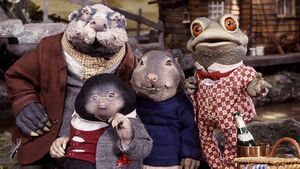
Kenneth Grahame's much loved characters were considered to reflect a 1920s class structure, at odds with the Blair-era's egalitarian aims. A Ladybird press-statement insisted that "Children no longer recognise the indulged aristocrat represented by Toad. Neither do the genteel, work-shy characters of Rattie and Badger reflect what they see around them, and we see no reason to perpetrate the class stereotypes represented by the socially ill-at-ese middle class Mole, or the criminally-inclined working class weasels.”
In the new edition, Toad still owns Toad Hall and its estate, having purchased it from the National Trust using wealth accumulated as a successful Hip-hop artiste. Mole remains the most sympathetic character, though now he is a Cuban Double-Agent plotting the overthrow of the government and a redistribution of the British stockpile of quality, hand-rolled cigars. Badger is a retired Policeman living on the proceeds of a lifetime of corruption and terrorising Toad's hard-working weasel tenant-farmers by threatening to spread bovine TB to their cattle.
In this rendering of the tale, Toad is arrested for speeding in his Porsche and fails a road-side breath test. Imprisoned for driving under the influence of both drink and drugs, the Toad Hall estate is taken over by the hard-drinking but adorable weasels, who declare it an Organic Workers’ Co-operative. Under the inspired leadership of Chairman Dweasel Zappa (democratically elected for life under a mixed compensatory system of proportional representation incorporating ideas from re-weighted range voting systems favoured in North Korea), the majority of land was worked communally for the benefit of all, while small parcels of land were distributed among the workers so that families could individually benefit from their own labour, selling surplus grain to capitalist system that would otherwise grind them under its heel.
Working together, agricultural yields are improved through endless toil, selfless investment in land-improvement, and the peasantry's innate understanding of how to work with Mother Nature rather than against her. When the apple harvest comes round, the collective votes to brew hundreds of gallons of unrefined cider, electing a Homebrew-Soviet to organise a free festival, Stoatly Scrumpy. Invitations are sent to the persecuted and desperate workers of neighbouring estates, who are entertained with free-form Jazz, Magic Mushrooms and improvised lectures on Marxist Determinism and the meaning of Dialectal Materialism.
Eventually, the forces of reaction re-establish control through violence and cynical manipulation of the popular press. The weasels are forced to flee for their lives but, in a final scene, escape to Angola to support the UNITA rebels.
Goldilocks and the Three Bears
Despite the success of The Wind in the Willows, editors felt that the Edwardian literary obsession with anthropomorphic creatures was unhelpful to the development of children, depriving them of a realistic sense of the dog-eat-dog nature of real life. It was deemed important that infants were not sheltered from evolution's need to hone the gene-pool by ruthlessly exterminating the weak, the lame and the elderly. This could be best achieved by judicious editing of David Attenborough documentaries, focusing on scenes where hamsters ate their young, baby crocodiles consumed their siblings and Black Widow spiders their mates. The Three Bears would be retained, but in human form.
Daddy Bear was now a balding, middle aged man who, following a lifetime denying his inner Goddess, is in the process of transitioning. Mummy Bear, his second wife, was Visiting Professor of Comparative Anthropology at the University of Reading. Her high-functioning autistic daughter, Baby Bear, manually calculates pi to the many thousands of decimal places and smears her faeces on the walls. Despite Mummy Bear's well-paid academic position and lucrative book contracts, they live in a tower block in a deprived neighbourhood because "it's real, you know".
Goldilocks attempts to make her way up to Mummy Bear's flat through urine-soaked hallways. Which lift should she take? The large lift has a dead junkie stinking it up, the little lift is nothing but an empty elevator-shaft with a thirty foot drop to a dank cellar. The medium lift however is just right, but this has been noted by entrepreneurial youths who are taxing potential users £2.50 for each trip.
Goldilocks choses to take the stairs. But which stairs? The large stairs are under surveillance of the Vice Squad. The little stairs are so full of abandoned shopping trolleys and soiled mattresses that no progress is possible. But the medium stairs are just right and Goldilocks is able to make her way up to the eighth floor once she has negotiated her way past the boss of the third floor massive for the price of two E's and an expert blowjob.
Once on the eighth floor, she has little difficulty breaking into the flat as the door was recently kicked in during a drugs raid. Now, whose phone to steal? Daddy Bear's phone is too big. He’s still to update from a Nokia 3310 because he’s spending what little money he has on hormone injections and replacing his lingerie. Baby Bear's phone is too small, the iPhone 6 has so little operational RAM that it can barely connect to the internet at all now that Apple have ceased providing updates for IOS 8.0. Mummy Bear's phone is just right. It's only a Huawei but it's the P Smart Y7a, which is fast as fuck, boi and will be easy to dispose of down the pub.
Sadly, Mummy Bear's phone (and all Huaweis) is being tracked by the Government of the People's Republic of China who consider burglars a threat to society. Goldilocks is deemed an undesirable element best disposed of before the inevitable annexation of the United Kingdom. The British authorities are alerted and Goldilocks is apprehended snorting Cif from a cistern-lid in the Ladies of the Royal Oak.
This version sold well in Middlesbrough, where it was considered to be an aspirational guide to modern living.
2010s - Ladybird Books for Adults
In 2015, Ladybird began to publish books for adults.
The books parodied the style of the children’s books and include the titles:
Hangover Cures, in which Peter and Jane attempt to revive Mum with smelling salts, a fry up, a bucket of coffee, an air-horn and rifling through her bedside drawer to see if the buzzy-thing might help.
Wife Swapping for Beginners,, in which Mum and Dad first bring Dodgy Uncle Clive and Aunty Tina home but forget to close the parlour door.
A Swinger's Manual, in which Dodgy Uncle Clive brings his friends from the Rugby club round while Dad is at work.
Dealing with Chlamydia, in which Mum shouts at Dodgy Uncle Clive on the telephone before sobbing all afternoon.
Ditching the Bitch - Divorce for Him, in which father consults a lawyer after leaving the STI clinic.
Losing the Loser - Divorce for Her, in which Mum discovers that moving Aunty Tina in permanently makes her drink less and means that there's finally someone in the house who can fix the car, re-wire the basement, tackle burglars bare-handed and all without letting her pipe go out.
Living Alone - A Guide to Bedsit Living, in which Dad discovers that alimony payments leave him better off on benefits.
Dignitas - A Guide to Assisted Suicide, in which Dad decides that a long-lingering death by cirhosis is not for him.
These were a far cry from the first book published in 1940. In that more innocent age, Bunnikin's Picnic Party provided light-hearted instruction on how to further the spread of Myxomatosis and the importance of gutting rabbits before feeding them to one’s hounds.
The 2020s - Intellectually Challenging Ladybird Books
Following accusations that the English education system was being dumbed down, Education Minister, Michael Gove, overhauled the English and Welsh curriculum. New, more ambitious targets were set for children of all ages, culminating in GCSEs that a solid majority of children would fail. This, it was felt, would give those who passed a greater sense of achievement and allay the regrets of their parents for spending £80,000 on their private education.
To enable teachers to teach to the new syllabus, Ladybird books launched a more challenging series of books that could stretch the minds of the very brightest children while retaining many of the features of the 1950s originals.
These new editions featured the same six year olds, Peter and Jane going about similar activities as they always had but contemplating the meaning of existence and the fundamental nature of matter as they built go-carts, climbed trees or baited racial minorities.
The Ladybird Books of Quantum Physics for Beginners
The best selling series covered all aspects of Quantum Physics from the very basic theory first proposed by Bohr, Planck, deBroglie et al, but with a particular emphasis on the work of Paul Dirac. Dirac, Ladybird declared, not only accurately described the properties of Fermions and predicted the existence of antimatter, but put into solid, British English the thoughts and insights of a slew of scatterbrained colonials and square-heads.
Year 2 pupils were now required to read and memorise the Ladybird book of Quantum electrodynamics in which Peter and Jane explained how previous theories concerning the free electromagnetic field (developed via canonical quantization by treating the electromagnetic field as a set of quantum harmonic oscillators) was incapable of making quantitative predictions about the real world before having hot cocoa and a good night's sleep. The following morning, using nothing but a stick and a muddy patch on the lawn, Jane elucidates the importance of Dirac's wave equation in better describing relativistic electron behaviour.
"Hah!" says Peter. "That's one in he eye for Johnny Foreigner. Who'd have thought that the spin of an electron would be a half!"
"Or that the electron g-factor would be two," says Jane.
"I dare say that'll lead to a correct Sommerfeld formula for the fine structure of the Hydrogen atom," says Peter. "Once we've had a think about Operator Field Theory and Non-renormalisability."
"Well, I wouldn't know about that," says Jane. "I'm only six and a girl at that. Shall we go and kick the dead badger on the road?"
The Ladybird book of Antimatter
John and Jane make daisy-chains and collect butterflies while studying antimatter. Jane learns that the idea of negative matter had appeared in theories of matter long since abandoned. She and Peter laugh about the primitive nature of the vortex theory of gravity, and the inevitable acceptance of matter with negative gravity if one is stupid enough to believe in it.
"Like Dad!" says Jane.
"And Grandad," Says Peter. "He's still going on about Pearson's theory of a fourth dimension for the aether to flow from and into. The cantankerous, old fossil."
"Thank goodness for Paul Dirac and his relativistic version of the Schrödinger wave equation," says Jane.
"And thank goodness for doughnuts with a yummy, jammy centre," says Peter. "Come on, it's nearly lunchtime."
Over lunch they discuss how the Feynman–Stueckelberg interpretation states that antimatter and antiparticles are regular particles traveling backward in time.
"Perhaps," says Jane. "All I know is that antimatter particles have the same mass but the opposite charge vis a vis normal matter. Like positrons and electrons. When matter and antimatter meet they annihilate each other in a blast of pure energy."
"So," says Peter. “If matter-Jane meets antimatter-Jane, you'll both disappear!'
Jane cries.
The Ladybird Book of Spectral Absorption Analysis
While on the on holiday in Torquay, Peter and Jane consider Fraunhofer lines.
"The way I see it, " says Peter. "Light can be absorbed or emitted when an electron in an atom moves from one energy level to another."
"Yes, because electron shells lie at fixed energies," Jane agrees. "The light only takes on certain frequencies and appears as a series of stripes -called Fraunhofer lines - when split by a prism or multi-slit grating."
"That seems clear enough," says Peter. "I wonder why they named them after a beastly German when they were first observed by William Hyde Wollaston."
"I don't understand why the Fraunhofer d-line sometimes refers to the cyan Iron line at 466.814 nanometres, and sometimes to the yellow Helium D3 line at 587.5618 nanometres," says Jane.
"That's because you're just a stupid girl," says Peter.
Jane cries.
The Ladybird book of Wave-particle Duality
Peter and Jane are looking for frog-spawn in their pond. Jane is excited because she has new Wellingtons.
"They're blue because they're absorbing all the other frequencies of the electromagnetic spectrum," she says.
"Light is made of particles," says Peter.
"No, light is made up of waves," says Jane.
"No, it isn't," says Peter.
"Yes, it is," says Jane.
"All right then," says Peter. "Why don't you try deBroglie's three slit experiment?"
"I only have one slit," says Jane. "And I'm not showing it to you again after what you said last time."
She cries.
| Featured version: 22 March 2021 | |
| This article has been featured on the main page. — You can vote for or nominate your favourite articles at Uncyclopedia:VFH. | |
